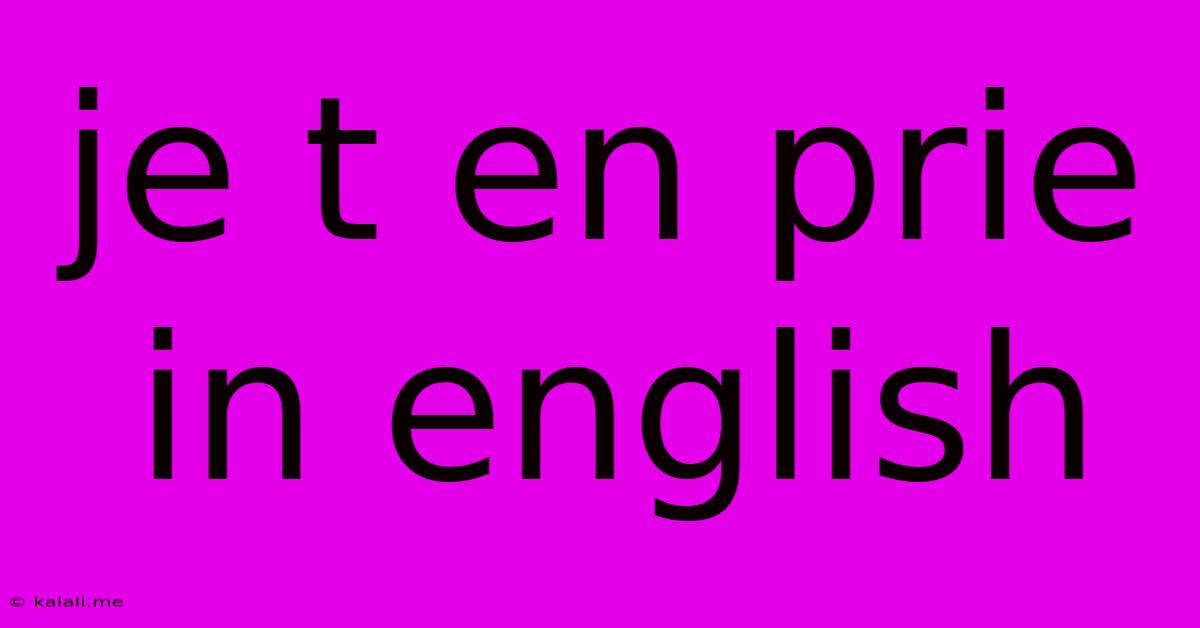Je T En Prie In English
Kalali
May 22, 2025 · 3 min read

Table of Contents
Decoding "Je t'en prie": More Than Just "You're Welcome" in French
"Je t'en prie" is a common French phrase often translated as "you're welcome." However, understanding its nuances reveals a richer meaning and more versatile usage than a simple, direct translation suggests. This article delves into the subtleties of "je t'en prie," exploring its various contexts and offering alternatives depending on the situation. Understanding this phrase will significantly enhance your French conversational skills and allow you to respond with greater fluency and appropriateness.
Beyond "You're Welcome": The Multiple Meanings of "Je t'en prie"
While frequently used as a response to "thank you," "je t'en prie" carries a slightly different connotation than the English "you're welcome." It's more formal and polite, conveying a sense of deference and graciousness. Think of it as a more elegant and less casual response. It implies a certain formality that "de rien" ("nothing") lacks.
Here's a breakdown of its diverse applications:
-
As a response to "thank you": This is the most common usage. Instead of the more informal "de rien," "je t'en prie" expresses deeper politeness and gratitude for the thank you itself.
-
As a polite request: This is where the translation becomes more complex. "Je t'en prie" can be used to politely ask for something. For instance, "Je t'en prie, passe-moi le sel" translates to "Please, pass me the salt." Here, it acts as a softer, more formal alternative to "s'il te plaît" (please).
-
To express a plea or humble request: In more formal settings, "je t'en prie" can convey a sense of urgency or desperation while maintaining politeness. Imagine someone pleading for help; "Je t'en prie, aidez-moi!" (Please, help me!) carries a greater weight than a simple "aidez-moi."
-
As an expression of apology: While less common, in some contexts, "je t'en prie" can be used to express apology or to soften a previous action. The nuance is subtle and depends heavily on context and tone.
Choosing the Right Response: Alternatives to "Je t'en prie"
The best way to respond to "merci" (thank you) depends largely on the context. While "je t'en prie" is always appropriate, consider these alternatives:
-
De rien: This is a more informal and common response, roughly translating to "nothing" or "don't mention it."
-
Il n'y a pas de quoi: This translates to "it's nothing" or "you're welcome" and is a more formal alternative to "de rien."
-
Avec plaisir: This means "with pleasure" and is appropriate when you genuinely enjoyed helping someone.
Mastering the Nuances of French Politeness
Understanding the subtle differences between these phrases is key to mastering French politeness. While "je t'en prie" translates literally as "I pray you," its modern usage is far less religious and much more about expressing courteousness and deference. By carefully choosing your response, you demonstrate a higher level of fluency and cultural understanding. The next time you hear "merci," you'll be equipped to respond with the perfect level of politeness and formality.
Latest Posts
Latest Posts
-
How To Get Super Glue Off Your Fingers
May 22, 2025
-
Gaucs To Pick Patterns From Time Series
May 22, 2025
-
What Does No Guard Do In Pokemon
May 22, 2025
-
X 2 1 X 1 X 1
May 22, 2025
-
How Many Cups Is A Box Of Powdered Sugar
May 22, 2025
Related Post
Thank you for visiting our website which covers about Je T En Prie In English . We hope the information provided has been useful to you. Feel free to contact us if you have any questions or need further assistance. See you next time and don't miss to bookmark.